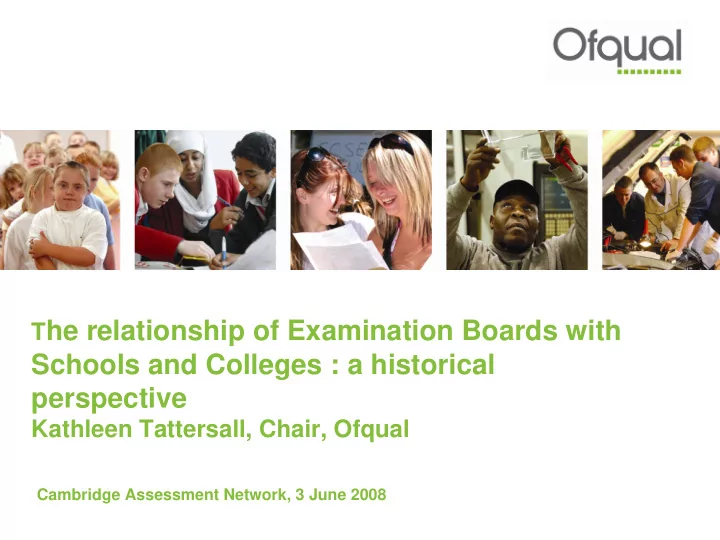

T he relationship of Examination Boards with Schools and Colleges : a historical perspective Kathleen Tattersall, Chair, Ofqual Cambridge Assessment Network, 3 June 2008
Early Boards: University Links • Guidance on standards • Setting of syllabuses, examinations, responsible for marking • Emergence of School Certificate and GCE • Accountable to Universities Teacher Involvement • On Board committees, Councils • Advisors on practical issues • (Later) trusted to assess their students • Consortium moderation
CSE Boards: “Teacher Control” • Guardians of standards • CSE Grade 1 = GCE O-level pass standards Modes of examining • Board provided – Mode 1 • School provided – Mode 3 Philosophical differences • Roles/relationships between teachers and Board officials Teacher judgement and/or statistics Regionalism • CSE and GCE
Teacher Assessment: Course work Moderation • Consortium, inspection, statistical Controls Where have all the Mode 3s gone? Training for assessment • Who provides, when, who pays?
Radical changes to the system National Curriculum Entitlement National Standards Fewer Awarding Bodies Competition and Performance Tables Shift of responsibilities from LEAs Withdrawal of Universities Greater control from Government and its agencies National strategies and targets
Whatever happened to professional engagement? of Teachers of LEAs of Universities of Awarding Bodies?
Questions to be addressed? How do we re-engage the professionals? How do we underpin the quality of the system? How do we engender public trust in the system?
Public sector management Managerialism Professionalism Source of legitimacy Hierarchical authority Expertise Goals/objectives Efficiency/profit Effectiveness/technical competence Mode of control Rules/compliance Trust/dependency Clients Corporate Individuals Reference group Bureaucratic superiors Professional peers Regulation Hierarchical Collegial/self-regulation (Exworthy and Halford, 1999)
Recommend
More recommend